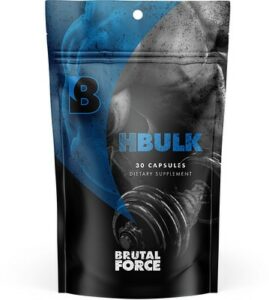
Human growth hormone (HGH) is an essential element in the progression and advancement of the human body. It allows our bones, muscles, organs, and all other tissues to secure a strong framework while developing over time. Recently HGH has become increasingly popular among athletes and bodybuilders who strive for peak performance enhancement and desired aesthetics. This miraculous compound produced by the pituitary gland can supercharge your progress, building muscle or increasing power output!
Nevertheless, as the use of HGH increases, we must be wary of its potential unfavorable adverse reactions – particularly regarding gut health and Palumboism. The digestive system (extending from one's mouth to the anus) is responsible for separating food and absorbing nutrients effectively. Palumboism is a medical condition where abdominal muscles are distended due to overuse of human growth hormone supplements. Thus it serves us well not to take more than what our doctor has prescribed!
There's no shortage of myths and false notions regarding HGH and its consequences on the gut and Palumboism. Some erroneously assume that it induces bloating, cramping, or constipation in the stomach; others purport that it contributes to Palumboism – a condition where abdominal muscles become grossly enlarged. Herein lies an effort to unearth what is fact from fiction when comprehending how precisely HGH affects these regions of our body.
We Recommend: Brutal Force HBulk – A Legal Somatropin Alternative
HGH & Gut Issues
Despite the common misconception that Human Growth Hormone (HGH) therapy can have adverse effects on gut function, like bloating, cramping, and constipation, there is no proof to back up this claim. In truth, research has proven that taking HGH does not significantly influence your gastrointestinal processes.
To stress its importance, HGH therapy should only be prescribed to individuals with a recognized growth hormone deficiency who need it. These persons are then supervised by healthcare professionals who observe any potential gut issues that may surface due to other probable conditions or drugs used.
It is important to note that if someone uses HGH recreationally or in doses greater than prescribed, several factors are associated with gut issues. For instance, combining other performance-enhancing drugs, such as steroids, can cause digestive problems. Moreover, inadequate nutrition consisting of processed foods and low fiber intake could lead to more severe health implications on one's gastrointestinal tract.
Recreational users of HGH may take too much, leading to an imbalance in the body that can result in digestive problems and other symptoms. Therefore, individuals considering using this hormone should speak with their doctor about the correct dosage and any potential side effects before beginning therapy.
HGH & Palumboism
Palumboism is an affliction characterized by swollen abdominal muscles and is often attributed to excessive HGH use. It has been named after the bodybuilder Dave Palumbo who was famously diagnosed with this disorder. Despite popular belief that alleges a correlation between HGH intake and Palumboism, no scientific evidence currently exists to support such notions.
It is critical to acknowledge that HGH therapy is usually only prescribed medically necessary treatments for growth hormone deficiency. Patients are under the watchful eye of medical specialists, so other medicinal problems or medicines could cause any Palumboism troubles.
Despite this, those who use HGH for recreational purposes or in excessively high amounts compared to the prescribed dose may probably acquire Palumboism. This occurs due to their intensive consumption since HGH raises muscle mass and, if multiple with an excessive intake of calories, can bring about fat build-up in the abdominal region.
Furthermore, inadequate training and nutrition can also contribute to the onset of Palumboism. When Human Growth Hormone is combined with improper dieting and exercise habits, it can create muscle imbalances that cause abdominal muscles to look swollen or distended, reducing definition and potentially leading to structural issues.
To summarize, Palumboism is not solely caused by Human Growth Hormone (HGH) intake. It's due to the induction of copious amounts combined with improper diet and exercise plans that can lead to this malady. Before embarking on an HGH therapy regimen, it's essential for people to chat about overdosage and possible side effects with a health expert as well as devise effective eating habits and training regimens.
Related: What is HGH?
What is HGH Gut?
The Human Growth Hormone (HGH) Gut, also known as an enlarged stomach and intestines due to the overproduction of human growth hormone, is an uncommon side effect of HGH therapy. Even though few studies explain this adverse reaction with certainty, it is assumed that when synthetic hormones are given to individuals who lack them naturally, they can cause a disproportionate expansion in their digestive system.
Since its FDA approval in 1985, HGH therapy has been used to treat various conditions, including growth hormone deficiency, Turner syndrome and muscle wasting caused by HIV/AIDS. Despite the numerous benefits of this treatment, it can cause an adverse side effect known as the ‘HGH gut.' This is believed to occur due to excessive cell growth within the stomach and intestines resulting from increased levels of HGH in the body; however, thankfully, these effects are reversible should you discontinue your course.
Myths And Facts About HGH Gut
Myth: HGH gut is a common side effect of HGH therapy.
Fact: HGH gut is a rare complication of HGH therapy and occurs in only a small percentage of individuals who receive the treatment.
Myth: HGH gut only affects the stomach.
Fact: HGH gut can affect the stomach and the intestines, leading to an enlarged abdomen.
Myth: HGH gut is irreversible and can only be treated with surgery.
Fact: HGH gut is usually reversible with the discontinuation of HGH therapy. Surgery may be required in severe cases, but in most cases, the condition will improve with the cessation of HGH therapy.
Myth: HGH therapy is only used for bodybuilding and athletic performance enhancement.
Fact: HGH therapy is primarily used for treating growth hormone deficiency and other medical conditions. The FDA does not approve it for bodybuilding or athletic performance enhancement, and it's illegal to use it for those purposes.
Myth: HGH therapy is safe and has no side effects.
Fact: HGH therapy can have potential side effects, including HGH gut, and should only be used under the supervision of a healthcare professional. It's important to discuss the risks and benefits of the treatment with a qualified healthcare provider before starting HGH therapy.
We Recommend Hbulk by Brutal Force
What Can I Do To Avoid HGH Gut And Palmboism?
- Follow your doctor's instructions: To reduce the risk of HGH gut and other possible side effects, follow your doctor's recommended dosage instructions when taking Human Growth Hormone therapy.
- Monitor your symptoms: Remain vigilant of any unusual alterations to your abdominal structure or size and promptly inform your physician if you experience any symptoms.
- Maintain a healthy diet: Nourishing yourself with a balanced diet abundant in fresh produce, lean protein, and other nutrient-dense foods can benefit your body's development and maintenance processes while diminishing the likelihood of negative impacts.
- Exercise regularly: Frequent physical activity is essential for maintaining muscle mass and can help stave off the effects of atrophy, decreasing your chances of experiencing adverse side effects.
- Avoid using HGH for non-medical reasons: HGH should be used only under the watchful eye of a medical professional and is necessary for specific health issues. However, using HGH to improve bodybuild
 ing techniques or athletic performance enhancement is not allowed and can cause severe side effects. Therefore, you must consider any risks before taking this action.
ing techniques or athletic performance enhancement is not allowed and can cause severe side effects. Therefore, you must consider any risks before taking this action. - Have regular check-ups with your doctor: Regular check-ins with your healthcare team not only give you a chance to ask questions or voice any worries but will also let them track your progress and adjust therapy as needed. Doing so is essential for successfully managing health conditions.
It's essential to recognize that HGH gut and Palumboism are infrequent aftereffects of HGH therapy, and most people taking this kind of treatment do not develop these issues. Nevertheless, it is critical to immediately speak with a medical expert if you encounter signs of HGH gut.
Brutal Force HBulk – Legal Alternative To Somatropin HGH
HBULK is the perfect supplement for those who want to boost their performance, gain quality muscle and reduce recovery time. It is a natural, safe, and fast-acting alternative to Somatropin without any side effects. Using a unique blend of amino acids, HBULK helps stimulate the body’s natural production of Human Growth Hormone (HGH) for rapid and lean muscle growth. With HBULK, you can achieve your desired physique in no time! So what are you waiting for? Get the powerful results of Somatropin without any side effects with HBULK today!
